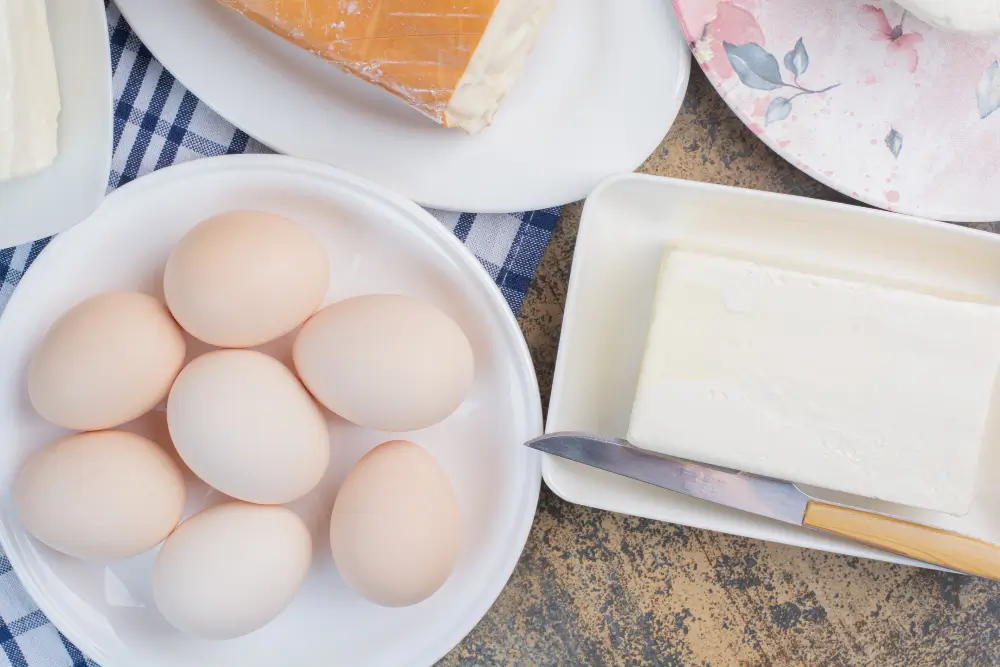
The world of food alternatives has grown leaps and bounds in recent years, and one intriguing question that has surfaced is, “Are there dairy-free eggs?” While eggs aren’t technically dairy, the rise of plant-based lifestyles and dietary restrictions has spurred the development of non-dairy egg alternatives, which are entirely free from animal-derived ingredients. This article delves into their benefits, production methods, and culinary versatility. Let’s crack open the topic and discover the delicious possibilities!
Introduction to Non-Dairy Eggs
What Are Non-Dairy Eggs?
Non-dairy eggs are plant-based alternatives designed to mimic the texture, flavor, and functionality of traditional eggs. Unlike regular eggs, they contain no animal-derived ingredients, making them a go-to choice for vegans, those with egg allergies, and people seeking more sustainable food options.
Why Explore Non-Dairy Egg Options?
The demand for non-dairy eggs arises from a combination of ethical, environmental, and health-conscious factors. For vegans, these alternatives are essential in many recipes. Those with egg allergies also benefit, as they can now enjoy dishes that would otherwise be off-limits. Moreover, as sustainable eating becomes increasingly important, plant-based egg substitutes are often more eco-friendly and gentler on the planet.
Overview of Non-Dairy Egg Market Trends
The market for plant-based alternatives is booming. Products like JUST Egg and Zero Egg have become household names, and their popularity continues to rise. These innovations aren’t just substitutes; they’re a testament to how far food technology has come, providing a delicious, cruelty-free option for everyday cooking.
Clarifying Misconceptions About Eggs and Dairy
Are Eggs Considered Dairy?
Despite common confusion, eggs are not a dairy product. Dairy refers to foods derived from the milk of mammals, like cows, goats, or sheep. Eggs, on the other hand, are laid by birds and have no relation to milk production. This distinction is crucial for dietary and allergen classification. For a detailed breakdown, refer to Healthline’s guide on eggs and dairy.
Understanding the Distinction Between Eggs and Dairy Products
The confusion often stems from their placement in grocery stores. Eggs are usually stocked near dairy products like milk, butter, and cheese, which leads some to lump them into the same category. However, unlike dairy, eggs do not contain lactose, making them suitable for people with lactose intolerance. Check out Medical News Today’s analysis for more insights on this topic.
Common Misunderstandings in Dietary Classifications
Another misconception arises in vegetarian and vegan diets. While vegetarians often include eggs, vegans avoid them as they’re animal-derived. These distinctions matter when exploring alternatives. As plant-based options rise, questions like “Are there non-dairy eggs?” highlight the growing interest in alternatives that fit diverse diets.
Plant-Based Egg Alternatives
Popular Vegan Egg Products
If you’re asking, “Are there non-dairy eggs?”, the answer lies in a variety of plant-based options. Leading the pack are innovative products like JUST Egg, known for its realistic texture and taste, and Zero Egg, which boasts versatility in cooking. These options are widely available and cater to both vegans and people with egg allergies.
Homemade Vegan Egg Recipes
For DIY enthusiasts, non-dairy eggs can be made with simple ingredients. Flaxseed or chia seeds mixed with water form a gel-like consistency perfect for baking. Similarly, chickpea flour creates a savory, scrambled egg alternative that’s high in protein and entirely dairy-free.
Nutritional Comparison Between Vegan Eggs and Traditional Eggs
Nutritionally, vegan eggs often provide fewer calories and less fat than traditional eggs. However, they’re typically fortified with vitamins like B12, which is essential for plant-based diets. While they may lack the protein punch of a regular egg, they shine in other areas, such as being cholesterol-free and environmentally sustainable.
Non-dairy egg products not only address dietary restrictions but also align with ethical and environmental priorities, offering a win-win solution for modern lifestyles.
Benefits of Non-Dairy Eggs
Health Benefits
Non-dairy eggs are a boon for health-conscious eaters. They’re cholesterol-free, making them an excellent option for individuals watching their heart health. Additionally, these alternatives are often free from allergens like dairy or traditional egg proteins, which makes them suitable for people with egg allergies. Products like JUST Egg are fortified with B vitamins, including B12, crucial for plant-based diets.
For a related guide on replacing dairy in recipes, visit Tangle Recipes’ article on scrambled eggs without milk.
Environmental Impact
Choosing plant-based eggs helps reduce the food system’s environmental footprint. Traditional egg production contributes to greenhouse gas emissions and uses significant water and land resources. Non-dairy alternatives are kinder to the planet, requiring fewer resources to produce and creating less waste.
Dietary Inclusivity
These products cater to a wide range of dietary preferences. Whether you’re vegan, lactose-intolerant, or simply exploring sustainable eating, plant-based egg alternatives integrate effortlessly into a variety of meals. Questions like “Are there dairy-free eggs?” reflect the inclusivity of modern food innovations.
Challenges and Limitations
Taste and Texture Differences
While non-dairy eggs mimic the qualities of traditional eggs, they may fall short in taste and texture for some people. Scrambled or fried, they may lack the richness of a yolk and require seasoning to enhance flavor. However, with practice, many find that these substitutes work beautifully in recipes.
Cost Considerations
Non-dairy eggs often come with a higher price tag compared to traditional eggs. For budget-conscious shoppers, this can be a barrier. Yet, as demand rises and production scales up, prices are expected to become more competitive.
Accessibility and Availability Issues
Availability varies widely depending on location. Urban areas might have easy access to brands like JUST Egg, while rural areas may need to rely on online retailers. However, with growing interest in plant-based products, this gap is slowly narrowing.
How Non-Dairy Eggs are Made

Overview of Key Ingredients in Non-Dairy Eggs
Non-dairy eggs are crafted using innovative combinations of plant-based ingredients. These products often rely on plant proteins like mung beans, chickpeas, or soy, which replicate the consistency and nutritional profile of real eggs. Natural stabilizers and binders, such as xanthan gum and tapioca starch, are also added to ensure the right texture and cooking properties. Fortification with essential nutrients like vitamin B12 and iron makes them even more appealing for vegans and those with dietary restrictions.
Manufacturing Process of Vegan Egg Alternatives
Creating non-dairy eggs involves several steps that combine advanced food technology and culinary science. The process typically begins with isolating proteins from plants, which are then mixed with other ingredients to achieve the desired consistency. To mimic the natural feel of eggs, these mixtures are heat-treated and emulsified. Thanks to these methods, products like JUST Egg successfully resemble scrambled eggs in both taste and texture.
Technological Innovations in Plant-Based Egg Production
Modern advancements have revolutionized the production of non-dairy eggs. Companies leverage cutting-edge research to make alternatives that closely replicate the real thing, not just in cooking but also in baking. For instance, aquafaba (chickpea water) has gained popularity as a natural binder, further expanding possibilities. With so much progress, it’s no surprise that more people are asking, “Are there non-dairy eggs?”
Culinary Uses for Non-Dairy Eggs
Cooking Applications
Plant-based egg substitutes shine in the kitchen for their versatility. They work wonderfully in scrambled dishes, offering a delicious breakfast option for vegans and those with dietary restrictions. Whether sautéed with veggies or seasoned with spices, these alternatives excel in both flavor and texture. They also serve as excellent bases for vegan omelets, allowing endless customization with fresh ingredients.
Baking with Egg Replacements
Baking without traditional eggs has long been a challenge, but innovative substitutes provide clever solutions. Flaxseed and chia seeds, when mixed with water, create a gel-like binder that works beautifully in various recipes. Commercial products like JUST Egg bring moisture and structure to cakes, cookies, and muffins. For those eager to experiment, these versatile options open the door to countless culinary possibilities.
Tips for Successful Cooking
A few tricks can elevate your experience when working with egg alternatives. Seasoning is key—turmeric and black salt (kala namak) can enhance their flavor profile, lending an authentic touch. Additionally, adjusting cooking times is crucial, as these substitutes often cook faster than traditional eggs. With practice, you’ll find plant-based options both enjoyable and rewarding to use.
From breakfast favorites to baked treats, egg alternatives prove their value. As more people embrace plant-based diets, these solutions confidently answer the question, “Can eggs be dairy-free?” with a resounding yes.
FAQs on Non-Dairy Eggs
What Are the Best Substitutes for Eggs in Baking?
For baking, flaxseed and chia seeds are among the best substitutes. When mixed with water, they form a gel that acts as a binder, making them perfect for cakes, muffins, and cookies. Store-bought options like JUST Egg also work well, providing the moisture and structure typically expected from traditional eggs.
Can You Make Scrambled Eggs Without Dairy?
Absolutely! Non-dairy eggs like JUST Egg or chickpea flour blends can be scrambled to perfection. Pair them with your favorite veggies and seasonings for a hearty, dairy-free breakfast. If you’re curious about more cooking ideas, explore our guide on creating tasty scrambled eggs without milk.
How Do Non-Dairy Eggs Compare to Real Eggs Nutritionally?
Non-dairy eggs are often lower in calories and fat but may lack the protein punch of real eggs. However, many are fortified with vitamins like B12, which is essential for plant-based diets. Their cholesterol-free nature also makes them a healthier choice for heart health.
Are Non-Dairy Eggs Suitable for People with Egg Allergies?
Yes! Since non-dairy eggs contain no animal-derived ingredients, they are an excellent alternative for people with egg allergies. These substitutes provide similar functionality in recipes while being entirely allergen-free.
Conclusion and Future of Non-Dairy Eggs
The rise of non-dairy eggs showcases the food industry’s dedication to inclusivity and innovation. By catering to vegans, those with allergies, and sustainability-minded individuals, these products are reshaping how we think about food. From scrambled eggs to baked goods, non-dairy eggs answer the question, “Are there non-dairy eggs?” with a resounding yes.
Looking ahead, the future of non-dairy eggs seems bright. As technology evolves, these alternatives will likely become even more realistic, affordable, and accessible. Their potential to reduce the environmental impact of traditional egg production also makes them a crucial part of a sustainable food future.
Incorporating non-dairy eggs into your meals is more than a trend—it’s a step toward ethical and environmentally friendly eating. Whether you’re trying them for health reasons or ethical concerns, these innovative alternatives prove there’s always room for progress at the table.

